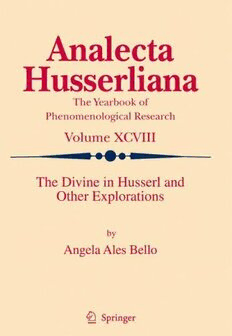
Angela Ales Bello The Divine In Husserl And Other Explorations PDF
Preview Angela Ales Bello The Divine In Husserl And Other Explorations
Analecta Husserliana The Yearbook of Phenomenological Research Volume XCVIII The Divine in Husserl and Other Explorations by Angela Ales Bello (cid:5)(cid:6)(cid:0)(cid:4) THE DIVINE IN HUSSERL AND OTHER EXPLORATIONS ANALECTA HUSSERLIANA THE YEARBOOK OF PHENOMENOLOGICAL RESEARCH VOLUME XCVIII Founder and Editor-in-Chief: Anna-Teresa Tymieniecka TheWorldInstituteforAdvancedPhenomenologicalResearchandLearning Hanover,NewHampshire Forothertitlespublishedinthisseries,goto http://www.springer.com/series/5621 ANGELA ALES BELLO THE DIVINE IN HUSSERL AND OTHER EXPLORATIONS Publishedundertheauspicesof TheWorldInstituteforAdvancedPhenomenologicalResearchandLearning A-T.Tymieniecka,President LibraryofCongressControlNumber:2008935900 ISBN978-1-4020-8910-7(HB) ISBN978-1-4020-8911-4(e-book) PublishedbySpringer, P.O.Box17,3300AADordrecht,TheNetherlands. www.springer.com WithkindpermissionofSant’AntonioEditrice ThisvolumehasbeenpublishedintheItalianlanguageas EDMUNDHUSSERL,PensareDio-CredereinDio ©2005Prov.Pad.FMCMessaggerodiS.AntonioEditrice BasilicadelSanto-ViaOrtoBotanico,11-35123Padova,Italia TranslatedbyAntonioCalcagno Printedonacid-freepaper AllRightsReserved ©2009Springer Nopartofthisworkmaybereproduced,storedinaretrievalsystem,ortransmitted inanyformorbyanymeans,electronic,mechanical,photocopying,microfilming, recordingorotherwise,withoutwrittenpermissionfromthePublisher,withthe exceptionofanymaterialsuppliedspecificallyforthepurposeofbeingentered andexecutedonacomputersystem,forexclusiveusebythepurchaserofthework. To Domenico A. Conci In memoria TABLE OF CONTENTS Introduction xi PART I THINKING GOD 1. Phenomenology as Philosophy sui generis 3 I. The Phenomenological Method 4 II. The Analysis of Lived Experiences: Immanence and Transcendence 10 III. Phenomenological Reductions: The Cartesian Way and the Way of Psychology 12 IV. The Phenomenological Approach to Anthropology 14 2. Husserl’s Question of God as a Philosophical Question 25 I. The Objective Way to God 25 II. The Subjective Way to God 28 III. The Intersubjective Way to God 33 IV. Hyle and Telos: The Way to God through the Hyletic 46 V. The Ethical Way 54 PART II BELIEVING IN GOD 1. The Husserlian Approach to Religion 65 I. Philosophy and Religion 65 II. A “Mystical” Way? 67 III. Christ and Christianity 69 IV. Theology and Faith 76 2. Religion as the Object of Phenomenological Analysis 81 I. Analysis of the Religious Phenomenon 83 II. Phenomenological Archeology of the Sacred 86 III. Phenomenological Archeology of the Religious 91 IV. Religion and Religions 95 vii viii TABLE OF CONTENTS PART III SOME EXPLORATIONS IN THE PHENOMENOLOGY OF RELIGION 1. Examples of Archeological Excavation 101 I. Ritual Objects in Archaic Sacrality 103 II. The Goddess in Archaic Sacrality 106 2. Ecstasy and Contemplation in Various Religious Experiences 113 I. Ecstasy in Shamanism 114 II. Contemplation in Hinduism 117 III. Christian Mysticism: Phenomenological and Mystical Hyletic 119 IV. Mystical Union and Contemplation in Sufism 123 3. God as “Third” or as “You”?: Comparing Philosophy and Religion 129 I. The Third from an Anthropological Perspective 129 II. The Divine as You and as Third 135 III. You and the Third: Religions Facing One Another 137 IV. Thinking the “Third” Philosophically 141 Conclusion 147 Bibliography 151 Index 157 ACKNOWLEDGMENT I owe a debt of warm gratitude to Professor Anna-Teresa Tymieniecka for her presence and attention along my research path in the phenomenology of religion,thefruitofwhichisthiswork,andforhavingacceptedtopublishit intheprestigiousseries“AnalectaHusserliana”,whichshecreatedandedits. Heart-filled thanks also go to Prof. Antonio Calcagno (King’s University College,UWO)forhistranslationofthiswork.Thankstohisdeepknowledge ofthephenomenologicalquestionstreatedherein,thetranslationofthisbook was executed with great care and attention. ix INTRODUCTION Reading the phenomenological analyses of Husserl in a theo-logical fashion, understood in the etymological sense of a discourse about God, signifies taking up a challenge and exploring a new territory. Husserl perhaps never would have wanted this theme, which was marginally treated in his work, to become a proper object of specific research precisely on account of its marginality. I had already taken up the challenge in the 80s when I collected and considered Husserl’s arguments on the topic in my book, Husserl—On the Problem of God,1 and I have continued to focus on this theme because, first, I am interested in it as a theoretical argument. Secondly, having chosen as the focus of my research an investigation of the contributions of phenomenologytoquestionsrelatedtohistory,science,andanthropology,2 it seemednecessarytoaskaboutthenatureofphenomenology’srelationshipto “God”.Iplacetheword“God”inquotationmarksbecausedivinityisspoken of in many ways. I propose to investigate whether phenomenology is able to clarify the modalities of the human being’s approach to God. I would like to individuate three of these modalities: the first is related to a philosophical position; the second to religious experience; and the third is related to mysticism. One must not forget that the theological point of view is delineated within these modalities, including a “scientific” viewpoint that is interested in sacred things. Also, there are sociological and psychological viewpointsthattreatbeliefinGodanditsinstantiationsonthepersonallevel. InthefirstpartofthetextthatfollowsIfixmyattentionprimarilyontwo modalities,namely,thephilosophicalandreligiousones.Infact,areadingof Husserl’s writings on these arguments compels us to examine his very own personality. Being a philosopher, how did he confront the question of God fromapurelytheoreticalperspective?Secondly,beingabelieverreflectingon hisfaithandtheobjectofhisfaith,howdidheviewhispersonalrelationship with God? Furthermore, within the context of the religious dimension, what isthevalueofthetwoattitudesthatseemsoopposedtooneanother,namely, thatofmysticalexperienceandthatofrationalinquiryofatheologicalnature? Also, other questions can be asked that stem from his research: being inter- ested in cultural problems, how does he interpret Christianity to which he xi
